- Home
- Roger Zelazny
Doorways in the Sand Page 14
Doorways in the Sand Read online
Page 14
Still?
I totted up my times. A day and a night and a piece of another day had passed. I had eaten several meals, talked with Doctor Drade and been auscultated by the interns. Hal had come back, happier, left me cigarettes which Drade had told me I could smoke against his wishes, which I did. Then I had slept some more. Oh yes, there I was . . .
Two figures passed into my slitted field of vision, moving slowly. The throat-clearing sounds which then occurred were Drade’s.
Finally: “Mister Cassidy, are you awake?” he seemed to wonder aloud.
I yawned and stretched and pretended to come around while I assessed the situation. Beside Drade stood a tall, somber-looking individual. The dark suit and smoked glasses did that for him. I suppressed a wisecrack about morticians when I saw that the man’s right hand was wrapped about a guide harness attached to a scruffy-looking dog that tried to sit at attention beside him. In his left hand the man held the handle of a heavy-looking case.
“Yes,” I said, reaching for the controls and raising myself to sit facing them. “What’s up?”
“How do you feel?”
“All right, I guess. Yes. Rested.”
“Good. The police have sent this gentleman along to talk with you about whatever it is they are interested in. He has requested privacy, so we will hang a sign on the door. His name is Nadler, Theodore Nadler. I’ll leave you alone now.”
He guided Nadler to a visitor’s chair, saw him seated and left, closing the door behind him.
I took a drink of water. I looked at Nadler.
“What do you want?” I said.
“You know what we want.”
“Try running an ad,” I suggested.
He removed his glasses and smiled at me.
“Try reading a few. Like ‘Help Wanted.’ ”
“You ought to be in the diplomatic corps,” I said, and his smile went tight and his face reddened.
I smiled then as he sighed.
“We know that you do not have it, Cassidy,” he finally said, “and I am not asking you for it.”
“Then why push me around the way you have? Just because I’m pushable? You’ve really shot me down, you know, forcing that degree on me. If I did have anything that you wanted there would be a big price tag on it now.”
“How big?” he said, just a little too quickly.
“For what?”
“Your services.”
“In what capacity?”
“We were thinking of offering you a job you might find interesting. How would you like to become an alien culture specialist for the U.S. legation to the United Nations? The job description calls for a Ph.D. in anthropology.”
“When was the job description written?” I asked.
He smiled again.
“Fairly recently.”
“I see. And what would the duties be?”
“They would commence with a special assignment, of an investigatory nature.”
“Investigating what?”
“The disappearance of the star-stone.”
“Uh-huh. Well, I have to admit that the matter appeals to my curiosity,” I said, “but not so much that I would be willing to work for you.”
“You would not actually be working for me.”
I got hold of my cigarettes and lit one before I asked, “For whom, then?”
“Give me one of those,” said a familiar voice, and the scruffy-looking dog rose and crossed over to my bedside.
“The Lon Chaney of the interstellar set,” I observed. “You make a lousy dog, Ragma.”
He unsnapped several sections of his disguise and accepted a light. I could not make out what he looked like inside.
“So you went and got yourself shot again,” he said. “It is not as if you had not been warned.”
“That is correct,” I said. “I did it with my eyes open.”
“And reversed,” he said, pushing aside my blanket and staring downward. “The scars are on the wrong leg for the wounds you sustained in Australia.”
He let the blanket fall and went to hunker beside my table.
“Not that I needed to look,” he added. “I overheard things about your wonderful reversed heart on the way in. And I sort of felt all along that you had to be the idiot who was fooling around with the inversion unit. Mind telling me why?”
“Yes,” I said, “I would mind.”
He shrugged.
“All right. It is still a bit early for malnutrition. I’ll wait.”
I looked back at Nadler.
“You still haven’t answered my question,” I said. “For whom would I be working?”
This time he grinned.
“Him,” he said.
“Are you kidding? When did the State Department start hiring wombat impersonators and guide dogs? Nonresident alien ones, at that?”
“Ragma is not a State Department employee. He is lending his services to the United Nations. On coming to work for us you would immediately go on loan to the special UN task force he heads.”
“Sort of like a library book,” I said, looking back toward Ragma. “Do you want to tell me about it?”
“That is why I am here,” he said. “As you are obviously aware, the artifact generally known as the starstone is missing. You were apparently in possession of it for a time, and as a consequence you are the focus of interest for a number of parties concerned with its recovery—for a variety of reasons.”
“Paul Byler had it?”
“Yes. He was commissioned to construct a display model.”
“Then he was pretty careless with it.”
“Yes and no. A most peculiar man, Professor Byler, and the subject of a coincidence that complicated matters in a fashion that could not have been foreseen. You see, he was approached to undertake the job because he was considered one of the best qualified persons about for that sort of work. He had done all manner of clever things involving synthetics and crystals and such in the past. And he produced a beautiful specimen, one that a reviewing board was actually incapable of distinguishing from the supposed original. A tribute to the man’s skill? So it seemed, at first. I do not know how the deception could have been uncovered by your people in the ordinary course of events.”
“He kept the original and gave them back a copy, along with a copy of the copy?”
“Nothing quite that simple,” Ragma said. “As it turned out, the object they gave him to duplicate was not the star-stone. A substitution had actually taken place much earlier—within minutes, as we understand it now, of the formal receipt of the stone by the Secretary General of the United Nations. Perhaps you saw that event televised?”
“I guess everyone did. What happened?”
“One of the guards exchanged it for a false stone while conveying it to the vault. The exchange went undetected, he made off with the genuine item and Professor Byler received the counterfeit for duplication.”
“Then how could Paul have any part in . . .?”
“The coincidence,” he said, “the one coincidence allowable in every story. I am surprised that you did not ask me where the guard obtained the ringer.”
I sagged slightly. I wondered whether it would hurt my chest much if I laughed.
“Not. . . Paul?” I said. “Tell me he didn’t make the first counterfeit.”
“But he did,” said Ragma. “Just from a few advance photos and a written description. Now there is a tribute to his skill. When it came to technique, he really was the best choice.”
I mashed out my cigarette.
“So he got his own counterfeit back to counterfeit?”
“Precisely. Which placed him in a very awkward position. There he was with the real thing, working on an improved counterfeit, now that he had something better than photos and descriptions to go on, and the UN approached him to duplicate his original work.”
“Wait! He had the real one? I thought the guard had taken the real one.”
“I was just getting to that. The guard removed
it and transported it to Professor Byler. Byler was afraid that the first counterfeit would not stand close scrutiny, especially from some visiting alien who might have seen it elsewhere and known something concerning its physical makeup—something which perhaps only an alien could detect. At any rate, his intention was to produce a superior replica the second time around and then have the same guard try to exchange it for his earlier model. The second version, he believed, could stand scrutiny for a much longer while. So he was faced with a dilemma at that point: Give them back the first one and a copy, or give them two of the second-generation stones of which he was quite proud. He resolved it by returning the first one and a copy, as he feared the authorities might by then have done a detailed study of its properties and have them on record as its authentic specifications.”
I shook my head.
“But why? Why go through the whole rigamarole in the first place?”
Ragma put out his cigarette and sighed.
“The man possesses a powerful emotional commitment to the British monarchy—”
“The crown jewels!” I said.
“Exactly. The star-stone came and they went. He was obsessed by their departure, by what he considered the unfairness of the deal, the insult to the sovereign.”
“But they are, in effect, still theirs and still available. The British approved their indefinite loan under those terms.”
“We both seem to see it that way,” Ragma said. “He does not. Neither do some of those—such as the guard—who cooperated with him in the venture.”
“What, specifically, did they plan on doing?”
“Their intention was to wait for a time, until your relations with the other races had broadened and the benefits of this association had become firmly fixed in the public mind. At that point they would announce that the star-stone was a fake—a fact readily verifiable by extraterrestrial authorities—and then proclaim that they were holding the real one to ransom. The price, of course, was to be the return of the crown jewels.”
“So a screwball group was behind it. That even explains a certain toast I overheard in my apartment. They were doubtless waiting to question me, to learn where to go to steal it back again.”
“Yes. They have been looking for you. But then we have them under surveillance. They are more a nuisance than a threat, actually, and they might possibly even help us to locate the stone if we leave them unmolested. This seems enough to offset the inconveniences involved.”
“What would have happened if everything had gone as they planned it?”
“If the scheme succeeded, then the Earth would be expelled from the trading cycle and probably be blacklisted for normal trade, tourism and cultural and scientific exchanges. It would also seriously impair your chances of eventually being invited to join the formal confederation we possess, an organization roughly equivalent to your own United Nations.”
“And an intelligent man like Paul can’t understand this? It makes me wonder whether we are ready for something of that scope.”
“Oh, he does now. He is the one who gave us all the details as to what had occurred. And do not be too hard on him. Matters of sentiment are seldom mediated by the intellect.”
“What happened in his case, anyway? I had heard that he had been killed.”
“He had been attacked and severely abused, but police happened on the scene just as his assailants were departing. They possessed medical equipment to supply immediate emergency aid, and they rushed him to a facility where he underwent a number of organ implants, all of which proved successful. Thereafter, he contacted the authorities and told the entire story. His change of heart was prompted by the fact that his attackers had formerly been associates of his.”
“Zeemeister and Buckler,” I said, “did not strike me as the sort whose intellects are mediated by sentiment.”
“True. They are, basically, hoodlums. Until recently their major activities had involved organ procurement and smuggling. Before that they had done many other illicit things, but organs seem to have been going well recently. They were involved in the theft of the star-stone for monetary rather than idealistic reasons. None of the other members of the conspiracy were criminals in the professional sense of the term. This was why they hired Zeemeister—to plan the theft for them. His ultimate design, however, involved a brace of roods—”
“Doublecross,” I said, lighting another cigarette for him.
“Just so. He intended to appropriate the stone for himself somewhere along the line and restore it to the authorities in return for money and immunity from prosecution.”
“If that were to happen, how would it affect our chances with respect to eventual membership in the confederation?”
“It would not be as harmful as the use of it for the recovery of the crown jewels,” he said. “So long as you have it ready to pass along at the appropriate time, any intervening problems concerning its maintenance are your own concern.”
“Then what is your real part in this affair?”
“I do not like to look at things so terribly strictly,” he said. “You are new to the game, and I want to see that you get every break possible. I would like to see the stone recovered and the entire incident forgotten.”
“Decent of you,” I said, “so I will try to be reasonable. I assume that Paul retained the original stone and that he has told you he believes it passed into our custody during a certain card party in his lab.”
“That is correct.”
“So Hal and I possibly, even probably, had it in our apartment for a time. And then it vanished.”
“So it would seem.”
“What then, specifically, would you want me to do about it if I took this job?”
“Of first importance,” he said, “since you do not wish to go offworld to be examined by a telepathic analyst and since Sibla’s qualifications do not meet with your approval, I would like you to consent to the procedure in the case of my bringing a qualified person here to Earth.”
“So you still think a clue might be locked away somewhere in my mind?”
“We have to admit the possibility, do we not?”
“Yes. I guess we do. What about Hal? Maybe he has something at some buried level, too.”
“There is that possibility also, though I am inclined to believe him when he insists as he does that he left the stone behind. However, he has just recently given his consent to Mister Nadler to go along with any sort of mind-probing technique that may be of help.”
“Then I do, too. Bring on your analyst. Just so he knows his business and is in no position to lock me away on another world.”
“All right. That is settled, then. Does it mean you are accepting the job?”
“Why not? I might as well get paid for it—especially if the checks will be coming from the people who messed up my normal means of livelihood.”
“Then we will leave it at that for now. It will require several days for the transportation of the analyst I have located. For now, Mister Nadler has some forms and such for your signature. While you are dealing with these, I will be setting up a unit we have brought along.”
“What sort of equipment is it?”
“Your leg healed up nicely, did it not?”
“Yes.”
“I am prepared to do the same for your chest wound. You should be able to leave here this evening.”
“That would be most welcome. Then what?”
“Then you have only to remain out of trouble for a few days. This can be achieved either by locking you up or by keeping you under reasonable surveillance, with the understanding that you will seek to avoid troublesome situations. I assume you would prefer the latter.”
“You assume correctly.”
“Then fill out the papers. I am going to warm up the unit and put you to sleep shortly.”
Which is what happened.
Later, as they were preparing to leave—all the medical gear and standard forms stashed, Nadler in his shades, Ragma back in harne
ss—Ragma turned and said to me, almost too casually, “By the way, now that we have achieved something of an understanding, would you care to tell me why you got yourself reversed?”
And I was about to. There seemed no reason for withholding any of that slice of affairs, now that we were together in this thing, so to speak. I decided that I might as well tell him.
I opened my mouth, but the words did not assemble themselves and emerge properly. I felt a tiny constriction in my throat, a certain thickness at the base of my tongue and a spontaneous flexion of various facial muscles as I smiled faintly, nodded slightly and then said, “I’d rather go into that a bit later, all right? Say tomorrow or the next day?”
“All right,” he said. “No great urgency. When the time comes, we can reverse the reversal. Rest now, eat everything they give you and see how you feel. Mister Nadler or I will be in touch later in the week. Good afternoon.”
“So long.”
“We’ll be seeing you,” Nadler said.
They left the door slightly ajar behind them. I did not doubt for a moment that I still lacked the entire story. But then, so did they. I had just been willing to level with them and my body had handed me a brace of roods. I found this especially frightening because in some ways it reminded me of my experience on the bus ride home. I could still see the marks of concern on the old man’s brow as he asked me if I were feeling all right. Was it a similar thing that had taken me just now, a bizarre repercussion on my nervous system? An effect of the reversal? The timing was so smooth, though . . . I did not like it at all. Nothing I had ever come across in my checkered study of man and his manifold ways seemed of assistance at that moment.
President Eliot, we got problems.
AS THE CABLELIKE VINES or tentacles seized me, thigh and shoulder, hoisting me into the air to a position where, wrenching my neck, I was afforded a view of the thing’s massive trunk, down to where it emerged from the tub of slime in the center of the room, I reflected, as the enormous Venus’s-flytrap-type blades snapped open, revealing a reddish interior, that while it may be true that most accidents are caused by carelessness, I could in no way be held responsible this time. Since my departure from the hospital I had been a model State Department employee, totally circumspect in thought and deed.

 Seven Tales in Amber
Seven Tales in Amber Frost and Fire
Frost and Fire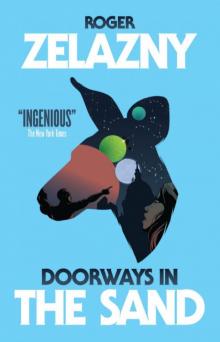 Doorways in the Sand
Doorways in the Sand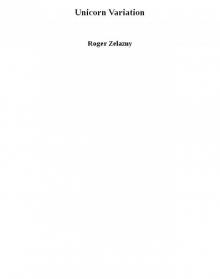 Unicorn Variation
Unicorn Variation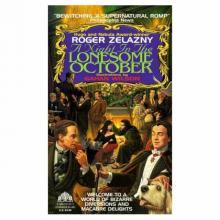 A Night in the Lonesome October
A Night in the Lonesome October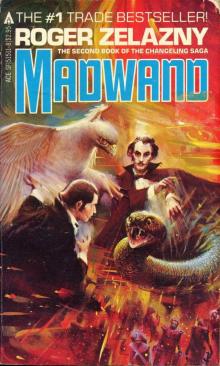 Madwand
Madwand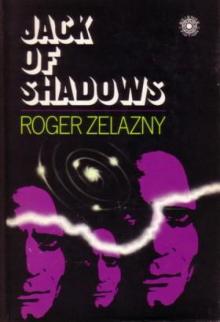 Jack Of Shadows
Jack Of Shadows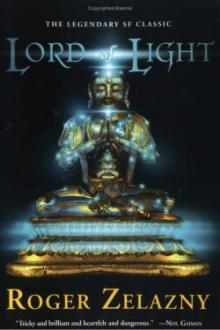 Lord of Light
Lord of Light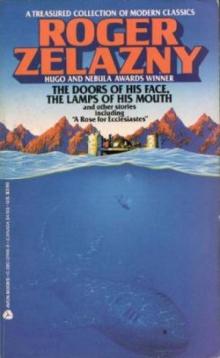 The Doors of His Face, The Lamps of His Mouth and Other Stories
The Doors of His Face, The Lamps of His Mouth and Other Stories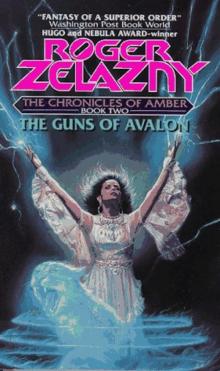 Guns Of Avalon tcoa-2
Guns Of Avalon tcoa-2 Coils
Coils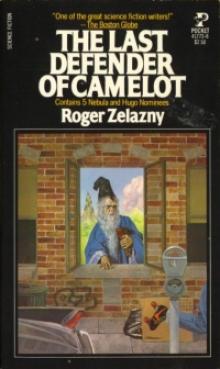 The Last Defender Of Camelot
The Last Defender Of Camelot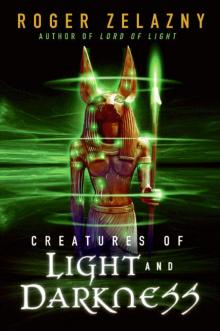 Creatures of Light and Darkness
Creatures of Light and Darkness This Immortal
This Immortal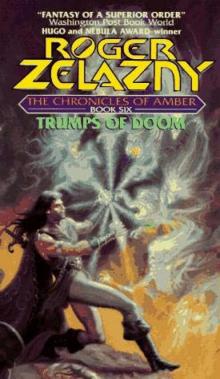 Trumps of doom tcoa-6
Trumps of doom tcoa-6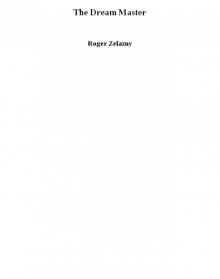 The Dream Master
The Dream Master The Complete Dilvish, The Damned
The Complete Dilvish, The Damned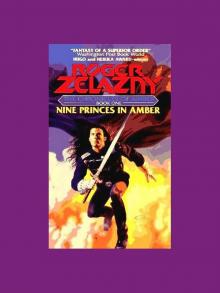 Nine Princes in Amber
Nine Princes in Amber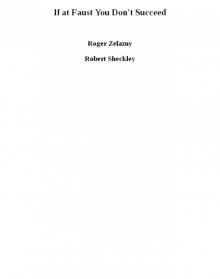 If at Faust You Don't Succeed
If at Faust You Don't Succeed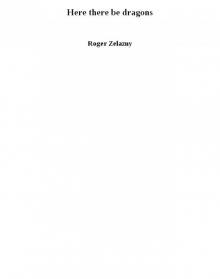 Here there be dragons
Here there be dragons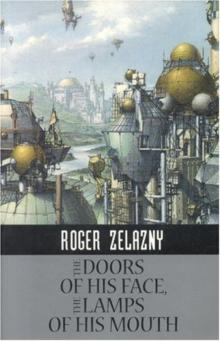 The Doors Of His Face, The Lamps Of His Mouth
The Doors Of His Face, The Lamps Of His Mouth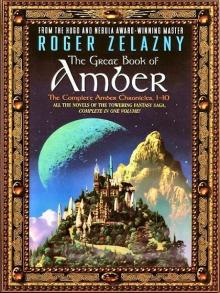 The Great Book of Amber - Chronicles 1-10
The Great Book of Amber - Chronicles 1-10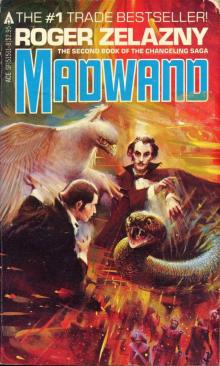 Madwand (Illustrated)
Madwand (Illustrated) The Chronicles of Amber
The Chronicles of Amber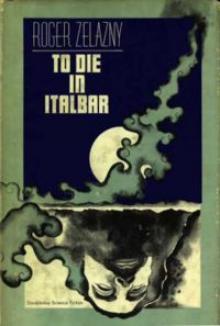 To Die In Italbar
To Die In Italbar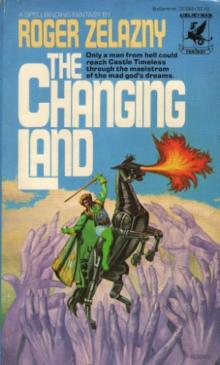 The Changing Land
The Changing Land The Furies
The Furies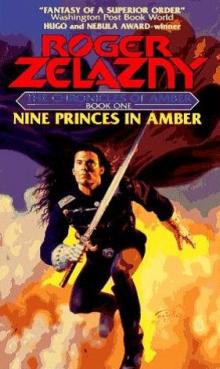 Nine Princes In Amber tcoa-1
Nine Princes In Amber tcoa-1 Last Of The Wild Ones
Last Of The Wild Ones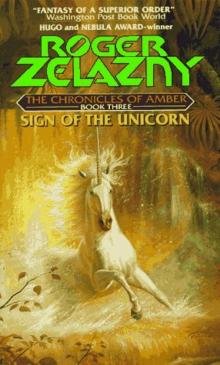 Sign of the Unicorn tcoa-3
Sign of the Unicorn tcoa-3 My Name is Legion
My Name is Legion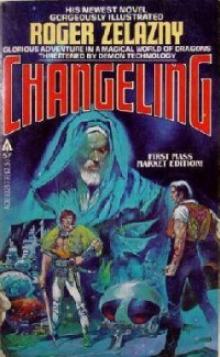 Wizard World 1: Changeling
Wizard World 1: Changeling Changeling
Changeling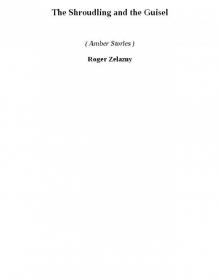 The Shroudling and the Guisel (amber stories)
The Shroudling and the Guisel (amber stories)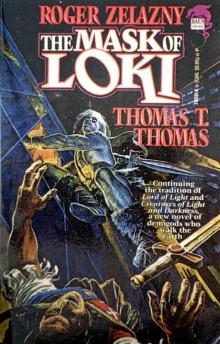 The Mask of Loki
The Mask of Loki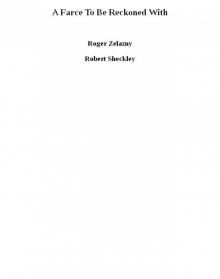 A Farce To Be Reckoned With
A Farce To Be Reckoned With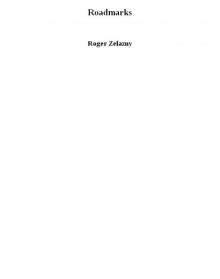 Roadmarks
Roadmarks When Pussywillows Last in the Catyard Bloomed (rtf)
When Pussywillows Last in the Catyard Bloomed (rtf)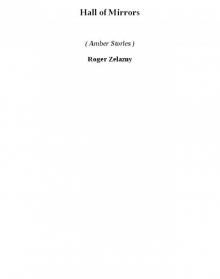 Hall of Mirrors (amber stories)
Hall of Mirrors (amber stories)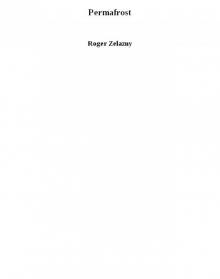 Permafrost
Permafrost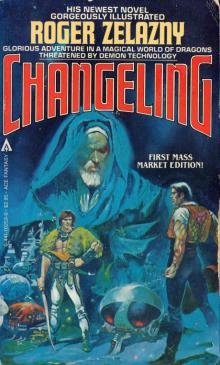 Changeling (Illustrated)
Changeling (Illustrated)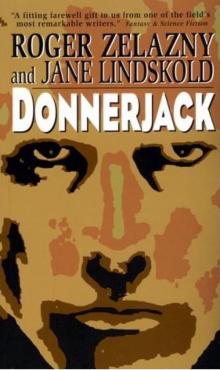 Donnerjack
Donnerjack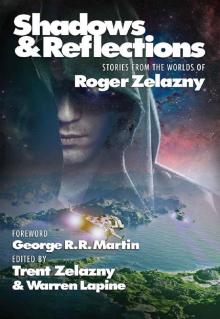 Shadows & Reflections: A Roger Zelazny Tribute Anthology
Shadows & Reflections: A Roger Zelazny Tribute Anthology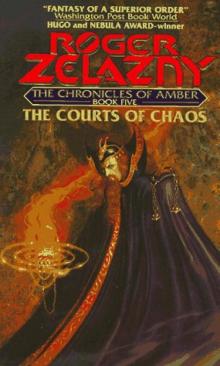 The Courts Of Chaos tcoa-5
The Courts Of Chaos tcoa-5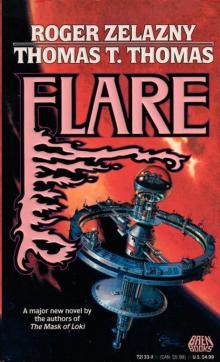 Flare
Flare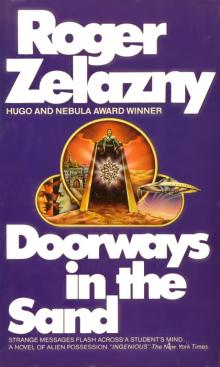 Doorsways in the Sand
Doorsways in the Sand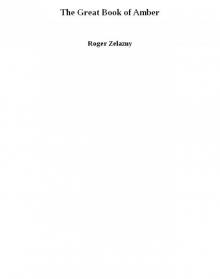 The Great Book of Amber
The Great Book of Amber Home Is the Hangman
Home Is the Hangman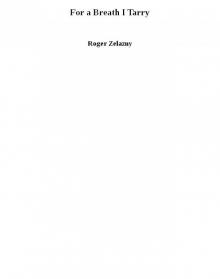 For a Breath I Tarry
For a Breath I Tarry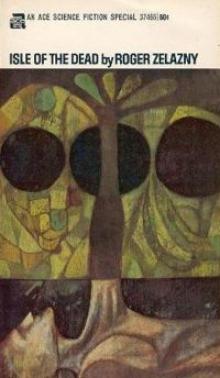 Isle Of The Dead
Isle Of The Dead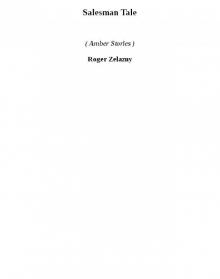 Salesman Tale (amber stories)
Salesman Tale (amber stories) Dismal Light
Dismal Light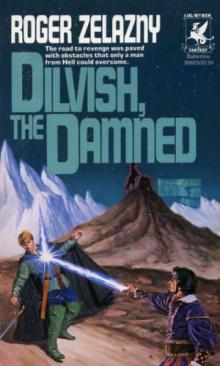 Dilvish, The Damned
Dilvish, The Damned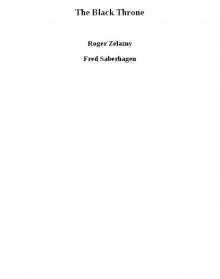 The Black Throne
The Black Throne Wizard World 2: Madwand
Wizard World 2: Madwand The Salesman's Tale
The Salesman's Tale